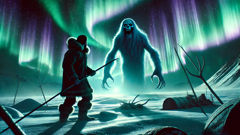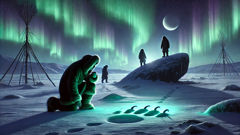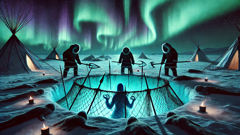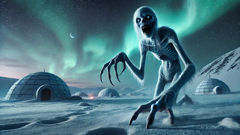Introduction
In the unyielding heart of the Canadian Arctic, where the wind howls without pause and darkness stretches for weeks at a time, a legend takes root in the minds of those who call this unforgiving land home. The Inuit, masters of survival in a world carved by ice and silence, have long whispered of a terror that glides across snowbanks on nights when the aurora flickers in uneasy patterns—a terror known as the Mahaha. To outsiders, the Arctic might seem empty and still, but those who listen closely know that it is alive with old stories, every drift and shadow charged with the possibility of something unseen. The Mahaha is not just any monster; it is a thin, blue-skinned figure, all sinew and frostbitten laughter, its long fingers tracing lines of cold that cut deeper than any blade. Its laughter—high and sharp, echoing across frozen lakes—signals doom, for the Mahaha does not hunt with teeth or claws, but with its peculiar, demonic touch: a tickling so cruel and relentless that it steals the breath from its victims, leaving twisted, frozen smiles behind. Villages have learned to fear the nights when laughter rides the wind, and parents caution their children never to stray alone, never to ignore the shiver that runs down the spine when all else is silent. Yet, within the darkness of this legend, there are also stories of bravery, cleverness, and the bonds that hold a community together against the ancient cold. For in every shadow cast by the Northern Lights, there is both fear and the faint possibility of hope.
The Laughter in the Wind
Long before maps bore names and before outsiders learned to fear the Arctic’s silence, a small Inuit village huddled at the edge of a frozen fjord. It was a place of close ties—families woven together through endless winters and fleeting summers, their every tradition shaped by the need to endure. The children knew every snowdrift and how the ice groaned in the night. They learned to respect the land, but more than that, they learned to fear the dark—a fear that grew stronger each time the elders gathered by seal oil lamps to share warnings of the Mahaha.

The Mahaha was not a story for entertainment. No one laughed when its name was spoken, for laughter itself had become suspect. The creature was said to be impossibly thin, draped in rags of blue skin so tight it seemed carved from frost. Its hair hung in wild, icy tangles, framing eyes that glittered with madness. But most unnerving of all was its laughter: shrill, unending, echoing just beyond the wind’s moan. It delighted in the suffering of those who strayed too far, using its long, bony fingers to tickle its victims until their screams gave way to laughter and finally to silence, their faces frozen in an eternal, twisted smile. The Mahaha, so the stories went, left no footprints except the sweep of its claws in the snow.
The villagers took every precaution as winter deepened. Children were warned never to wander alone after dusk, and the elders hung talismans—braided sealskin and carved bone—above every threshold. Hunters returning from distant floes would pause, listening for that dreadful giggle on the wind, their hearts pounding in their chests. One such hunter was Taqtu, known for his courage and his unwillingness to yield to the stories that made others quake. He was young and sharp-eyed, with a quick laugh that had so far survived many winters. His wife, Nuviaq, was more cautious, forever reminding him that the land was alive with old dangers. But Taqtu could not resist the thrill of a challenge, and when the seals proved scarce one year, he volunteered to search farther than anyone else dared.
On the night Taqtu set out, the sky was restless with shifting curtains of green and violet. He wrapped himself in furs, slung his spear across his back, and pressed a kiss to Nuviaq’s brow. “I’ll be back before the lamps burn out,” he promised. But Nuviaq hesitated, pressing a charm into his hand—a talisman woven from her own hair and bone beads, meant to ward off evil spirits. Taqtu laughed, promising to return with stories of his own bravery. Yet as he slipped away, Nuviaq felt a chill that had nothing to do with the wind.
The journey was long and quiet. Taqtu moved swiftly over the ice, guided by stars and the memories of paths he had learned as a child. The world was silent, broken only by the crunch of his boots and the distant cry of a hungry fox. But as he neared a place where old ice met open water, the silence changed. A strange sound threaded through the wind—high-pitched, echoing, impossible to place. Taqtu slowed, every sense alert. The laughter grew louder, slipping between gusts like a living thing. He gripped his spear tighter, remembering the stories he had dismissed so easily. Something moved at the edge of his vision, flitting from snowbank to boulder, too quick to see clearly. The laughter came closer, rising and falling in unnatural waves. Then, suddenly, a figure burst from the shadow of an ice hummock—impossibly thin, blue as the heart of winter, its mouth stretched in a rictus grin. The Mahaha. It moved with terrifying speed, and before Taqtu could react, icy hands seized him, fingers dancing along his ribs and arms, tickling with such intensity that he dropped his spear and doubled over, helpless. He fought to scream, but only laughter came—terrified, forced, uncontrollable. The world spun, his vision blurred with tears, and still the Mahaha laughed, higher and higher, until darkness claimed him.
The Search and the Smiling Shadow
The next day, when Taqtu failed to return, worry swept through the village like an icy wind. Nuviaq refused to sit idly by; she rallied her neighbors, determined to bring him home. She gathered Taqtu’s oldest friend, Siku—a stoic, broad-shouldered man whose silence masked a deep well of loyalty—and young Kalla, whose sharp eyes had tracked seals and foxes when older hunters missed the signs. The trio prepared for the journey with care: they dressed in the thickest furs, laced up boots against frostbite, and each carried a talisman for protection. The elders watched from their doorways, old faces creased with worry and resignation. “Do not let the laughter find you,” one warned. “If you hear it, cover your ears and run.”

Nuviaq nodded, clutching her charm and whispering a prayer. The search party set out beneath a pale sun, their breaths puffing clouds in the brittle air. Tracks were scarce; the overnight wind had wiped away almost every sign. But Kalla found the faint impression of Taqtu’s boots leading toward the old floes. As they moved farther from home, the landscape grew unfamiliar. Strange ice formations loomed like petrified spirits, and the silence felt brittle, ready to shatter at any sound.
Hours passed with no sign of Taqtu—until Siku spotted something half-buried in snow. It was Taqtu’s spear, snapped in two. Around it, a patch of disturbed snow led toward an outcrop. As they followed, Nuviaq’s heart pounded in her chest. She called his name, but only the wind answered. Then, suddenly, Kalla froze. “Look.”
There, sprawled at the base of an icy boulder, lay Taqtu. His face was twisted in a smile so unnatural it sent chills through Nuviaq’s bones. His eyes stared blankly at the sky, and his hands were clenched tight, as if he’d tried to fight something off. The snow around him was scuffed with strange marks—long, clawed impressions that didn’t match any animal. Siku knelt beside the body and felt for a pulse, but it was no use. Taqtu was gone.
Grief swept over Nuviaq in a wave, but it was quickly replaced by fear. The marks in the snow, the frozen smile, the way his body was splayed—it all matched the stories she’d grown up hearing. “The Mahaha was here,” she whispered, voice trembling. Kalla looked away, shuddering. Siku scanned the horizon, his hand drifting to the talisman at his throat.
They wrapped Taqtu’s body in furs and prepared to return home. But as they turned to leave, a faint, unnatural giggle rippled through the air—softer than the wind, but unmistakable. Siku’s eyes widened. “We must go. Now.”
The return journey was a nightmare. Every shadow seemed to move; every sound became suspect. At one point, Kalla swore he saw a blue figure flitting between distant drifts, always just out of sight. They pressed on, not daring to look back. By the time they reached the village, dusk had fallen and the aurora was dancing again—this time more violently than before.
Nuviaq shared their grim news, and the village went into mourning. But grief soon turned to dread as word spread of Taqtu’s death. The elders gathered everyone into the largest igloo and relit the old seal oil lamps. “The Mahaha is hungry this winter,” one said grimly. “We must strengthen our protections.” The villagers placed more charms at every entrance, burned sweetgrass and bone, and doubled the nightly watches. But still, laughter sometimes echoed in the wind, and families huddled closer together, fearful that the Mahaha would come again.
The Keeper of Old Stories
As fear gripped the village, Nuviaq refused to let despair take hold. She remembered the stories her grandmother used to tell—not just of monsters, but of those who had outwitted them. She sought out the village’s oldest resident, an elder named Akna, whose memory stretched back beyond living generations. Akna’s igloo was filled with talismans and old bones, each telling its own tale. Nuviaq explained what had happened to Taqtu and begged for guidance. The old woman listened in silence, her eyes sharp as a raven’s.

“When the Mahaha comes,” Akna rasped, “it brings not only death but madness. It feeds on loneliness and fear. But it can be tricked. Long ago, my mother’s mother faced it and lived to tell her tale.”
Akna explained that the Mahaha was not invincible. It craved laughter but could not understand kindness or cleverness. The only way to defeat it was to turn its own hunger against it. If someone could withstand its tickling long enough to make it believe they were not afraid—or to fool it into a trap—then it could be banished, at least for a time.
Nuviaq pondered this as she walked back through the village. She watched as families gathered around fires, whispering prayers and holding children close. Siku sharpened his spear, Kalla sat quietly carving a new talisman, and the rest of the villagers cast wary glances at every shadow.
As days passed, reports came from other villages: stories of lost hunters, of bodies found with frozen smiles, of laughter echoing over distant ice fields. Fear became a living thing. But Nuviaq would not let her husband’s death be in vain. She spoke to Siku and Kalla, sharing Akna’s advice. “If we can lure the Mahaha to us,” she said, “perhaps we can defeat it.”
The three devised a plan. They would use themselves as bait, drawing the creature close with laughter and then trapping it in a pit lined with sharpened bones and charms. It was dangerous—a desperate gambit—but they had little choice. As the night of their plan approached, Nuviaq felt a strange calm. She carried Taqtu’s broken spear as a reminder of what they had lost—and what they might still protect.
When the aurora again burned bright overhead and the wind rose with unnatural glee, Nuviaq, Siku, and Kalla slipped from the village. They found a place where the snow drifted thick and deep—a natural hollow perfect for their trap. Kalla scattered carved bone talismans around the rim while Siku set sharpened stakes in the pit below. Nuviaq took a deep breath and began to laugh—a wild, forced sound that rang out across the ice. Siku and Kalla joined in, their laughter rising into the night until it seemed the whole world was mocking the darkness.
For long minutes nothing happened. But then, from the edge of the darkness, a giggle answered them—shrill, eager, inhuman. The Mahaha emerged from the gloom, eyes blazing with hunger, mouth stretched wider than any human’s could go. Its fingers waggled in anticipation. Nuviaq’s heart hammered as the creature approached, drawn by their laughter. It pounced, but as it lunged for her, she sidestepped at the last moment, letting its momentum carry it into the pit. Siku and Kalla sprang into action, hurling nets woven from sealskin over the Mahaha and chanting the words Akna had taught them.
The creature shrieked and thrashed, its laughter turning to screams. It clawed at the nets, but every touch brought it into contact with the bone charms—each one burning like fire against its skin. Finally, with a last, furious howl, the Mahaha vanished in a gust of icy wind, leaving only silence behind.
Conclusion
With the Mahaha gone, a cautious peace settled over the village. The elders praised Nuviaq, Siku, and Kalla for their courage and cunning, and their story soon spread to neighboring communities. Children learned that even the oldest legends could be challenged—not with brute strength alone, but with wisdom, planning, and unity. The talismans above each doorway remained, and families still gathered close when the wind howled or the aurora shimmered in unsettling ways, but now there was a new story to tell: one of bravery in the face of ancient terror. Nuviaq never forgot Taqtu’s laughter or the twisted smile left behind. But she honored his memory by teaching the next generation what Akna had taught her—that monsters could be outwitted if people stood together, that courage was not the absence of fear but the willingness to face it anyway. And on nights when strange laughter rode the Arctic wind, parents would remind their children: beware the Mahaha, but remember that even in the deepest winter, there is always hope for those who refuse to yield.













